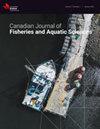Tracking aquatic animals to understand a world increasingly shaped by a changing climate and extreme weather events
IF 2.2
2区 农林科学
Q2 FISHERIES
Canadian Journal of Fisheries and Aquatic Sciences
Pub Date : 2023-12-06
DOI:10.1139/cjfas-2023-0145
引用次数: 0
Abstract
Despite great promise for understanding the impacts and extent of climate change on aquatic animals, their species, and ecological communities, it is surprising that tracking tools, like biotelemetry and biologging devices, have not been extensively used to understand climate change or develop and evaluate potential interventions that may forestall or mitigate its effects. In this review, we provide an overview of methodologies and study designs that leverage available tracking tools to investigate aspects of climate change on aquatic ecosystems. Key interventions to protect aquatic life from the impacts of climate change, including habitat restoration, protected areas, conservation translocations, mitigations against interactive effects of climate change, and simulation of future scenarios can all be greatly facilitated by using electronic tagging and tracking. We anticipate that adapting study designs (e.g. use of replicated ponds, randomized control trials, physiologging) to effectively use tracking will greatly enhance our understanding of climate change and its impacts on aquatic ecosystems, hopefully also facilitating research into effective solutions and interventions against the most extreme and acute impacts.跟踪水生动物,了解日益受到气候变化和极端天气事件影响的世界
尽管对了解气候变化对水生动物、其物种和生态群落的影响和程度有很大的希望,但令人惊讶的是,跟踪工具,如生物遥测和生物记录设备,尚未广泛用于了解气候变化或开发和评估可能预防或减轻其影响的潜在干预措施。在这篇综述中,我们概述了利用现有跟踪工具来研究气候变化对水生生态系统影响的方法和研究设计。通过使用电子标签和跟踪,可以极大地促进保护水生生物免受气候变化影响的关键干预措施,包括栖息地恢复、保护区、保护易位、缓解气候变化的相互影响以及模拟未来情景。我们预计,调整研究设计(例如使用复制池塘、随机对照试验、生理学)来有效地利用跟踪,将大大提高我们对气候变化及其对水生生态系统影响的理解,并有望促进针对最极端和最严重影响的有效解决方案和干预措施的研究。
本文章由计算机程序翻译,如有差异,请以英文原文为准。
求助全文
约1分钟内获得全文
求助全文
来源期刊

Canadian Journal of Fisheries and Aquatic Sciences
农林科学-海洋与淡水生物学
CiteScore
4.60
自引率
12.50%
发文量
148
审稿时长
6-16 weeks
期刊介绍:
The Canadian Journal of Fisheries and Aquatic Sciences is the primary publishing vehicle for the multidisciplinary field of aquatic sciences. It publishes perspectives (syntheses, critiques, and re-evaluations), discussions (comments and replies), articles, and rapid communications, relating to current research on -omics, cells, organisms, populations, ecosystems, or processes that affect aquatic systems. The journal seeks to amplify, modify, question, or redirect accumulated knowledge in the field of fisheries and aquatic science.
 求助内容:
求助内容: 应助结果提醒方式:
应助结果提醒方式:


